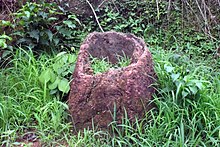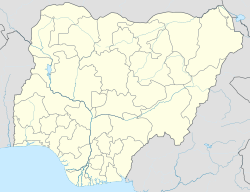Nok is a village in Jaba Local Government Area of Kaduna State, Nigeria. The village is an archeological site.
Nok | |
|---|---|
Village, Archeological site | |
| Coordinates: 9°30′0″N 8°1′0″E / 9.50000°N 8.01667°E | |
| Country | Nigeria |
| State | Kaduna |

Archaeology
editThe discovery of terracotta figurines at this location caused its name to be used for the Nok culture, of which these figurines are typical, which flourished in Nigeria in the period 1500 BC - 500 AD.[1][2] The artifacts were discovered in 1943 during mining operations.[3] The archaeologist Bernard Fagg investigated the site, and with the help of locals discovered many other artifacts.[4] Iron smelting furnaces were also found at Nok.[1]
Occupation dates far before the first iron smelting. A sample of carbonized wood found in the "main paddock" at Nok in 1951 was dated to around 3660 BC though there are questions about the reliability of this conclusion.[5]
References
edit- ^ a b Fiona MacDonald; Marshall Cavendish Corporation; Elizabeth Paren; Kevin Shillington; Gillian Stacey; Philip Steele (2000). Peoples of Africa, Volume 10. Marshall Cavendish. p. 383. ISBN 0-7614-7158-8.
- ^ Breunig, Peter. 2014. Nok: African Sculpture in Archaeological Context: p. 21.
- ^ "NOK TERRACOTTA HEADS, Nigeria". HAMILL GALLERY of TRIBAL ART. Retrieved 2011-01-10.
- ^ Aedeen Cremin (2007). "Nok, Nigeria". Archaeologica: The World's Most Significant Sites and Cultural Treasures. frances lincoln ltd. p. 108. ISBN 0-7112-2822-1.
- ^ Charles Brian Montagu McBurney; G. N. Bailey; Paul Callow (1986). Stone-Age prehistory: studies in memory of Charles McBurney. Cambridge University Press. p. 159. ISBN 0-521-25773-5.
